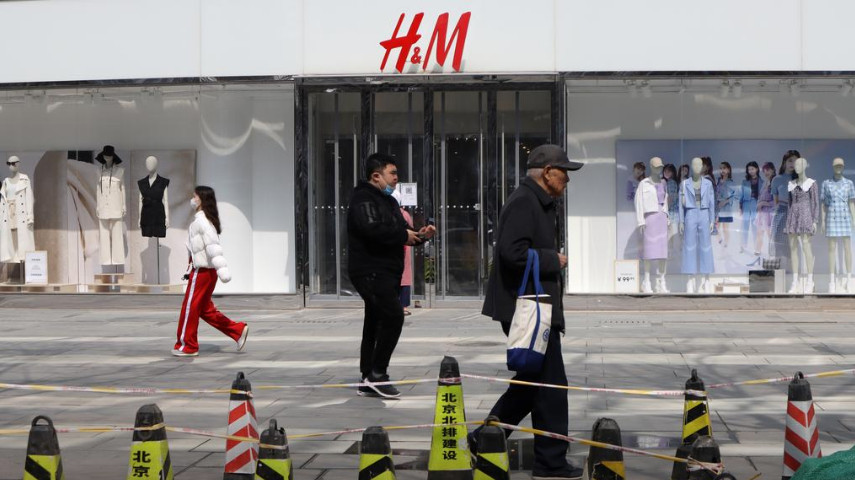Foreign firms in China trapped in the middle

Multinational companies in China are accustomed to navigating under political pressure, but the rules of the game are changing.
The Chinese government and consumers have attacked Nike, Adidas and Swedish company Hennes & Mauritz AB for promising not to use cotton from Xinjiang, which produces 80 per cent of national output of the material. These firms are under intense pressure from Western governments and civil associations to boycott Xinjiang cotton.
“Companies feel they are in a war zone now,” said Bennett Freeman, an American who advises multinationals on business strategy. “These apparel brands are in a nearly impossible place and have to decide which side of history they are on.”
The economic and political stakes in the conflict could scarcely be higher. In 2020, China’s GDP rose by 2.3 per cent, the highest of any major global economy. This year official estimates put growth at six-eight per cent, again the highest of any G7 economy. Over the next 10 years, 30 per cent of global growth will be in China.
“The China market saved many companies last year as its economy rebounded from the coronavirus,” said Joerg Wuttke, President of the European Chamber of Commerce in China. “At the same time, there is this kind of political pressure. You really have to just let it (Chinese criticism) happen, lay low and see when it blows over and then come back again.
“We are between a rock and a hard place,” he said. “Companies are in an impossible situation, needing to meet their commitments at home and in a very politicised environment in China.”
Foreign firms are the victims of a Cold War between China and the West that is worsening. In the last Cold War, from 1945 to 1991, few Western companies had invested in the Soviet Union and its satellite countries. They did not wish to depend on Western trade and investment.
But, in 2020, China ranked first in the world for foreign direct investment. It reached US$144.4 billion, an increase of 4.5 per cent over 2019. European and North American companies accounted for a large share of this figure.
Beijing is aware of its rising importance as a market and production centre for Western companies. Their home countries suffer from negative growth because of Covid and are unlikely to recover fully this year. With its diplomacy increasingly aggressive and ruthless, Beijing wants to exploit this dependence.
On the Western side, the rules of the game have changed. In April 2020, the U.S. Customs and Border Protection began to implement cotton bans. This has forced companies to reveal where in China their cotton came from. That was the tipping point from which there was no return.
Better Cotton Initiative is a Geneva-based ethical trade group with more than 2,000 brands as members, including Nike and H & M. It has told its members not to source cotton from Xinjiang.
Corporate governance in the West is changing. Shareholders, civil society and even banks are setting environmental, social and governance goals for companies. If firms ignore allegations or findings about abuses in Xinjiang, they and their shareholders may face consequences. It is reminiscent of the pressure on foreign companies that operated in South Africa during the apartheid era. Many were forced to withdraw from the market completely, until apartheid was abolished in 1994.
On Xinjiang, the companies face two narratives that have nothing in common. The one presented by China and its media describes rising living standards, social stability, increasing mechanisation and construction of roads, railways and airports to link the region with the rest of China, central Asia and Europe.
The other, presented by the exile Uighur community, NGOs and western governments, describe “re-education camps” where Muslims are forced to live and work and attend compulsory classes on Mandarin and Marxism. The camps aim to divorce them from their language, religion and traditions.
The companies have no way of verifying the truth, in the absence of objective observers trusted by both sides.
For Beijing, the Cold War also presents commercial risk. Its Wolf Warrior diplomacy plays well at home but not abroad. Not since the Cultural Revolution have public perceptions of China in the West and many Asian countries been so negative. It has led to hostility against Chinese firms and individuals, including the burning down of Chinese textile factories in Hlaing Tharyar, a suburb of Yangon, in mid-March.
This hostility could lead to a backlash and a boycott of Chinese products in the West.
On both sides, the stakes are getting higher.
-- Contact us at [email protected]
-

Equip young people for the future Dr. Winnie Tang
In late February, the inaugural flight of an air taxi from Shenzhen Shekou Cruise Homeport to Zhuhai Jiuzhou Port took only 20 minutes with an estimated one-way ticket price of 200 to 300 yuan per
-

Are we raising a generation of leaders, or of followers? Brian YS Wong
The essence of education is defined not by the facts it imparts, but the potential knowledge it inspires students to individually pursue on their own. Put it this way – the ideal form of education
-

The urgent need for reforms to sex education in Hong Kong Sharon Chau
Nearly one in every four university students (23%) in Hong Kong has been sexually harassed, according to a 2019 report published by the Equal Opportunities Commission (EOC). A 2019 study found that
-

STEAM should be linked to real life Dr. Winnie Tang
In the 2017 Policy Address, STEM (science, technology, engineering and mathematics) education was proposed as one of the eight major directions to promote I&T development. Since then, funding has
-

Let trees speak for themselves Dr. Winnie Tang
I often say that smart cities start with smart planning, but smart planning presupposes adequate, systematic and up-to-date data. This is important not only for city administration, but also for tree















